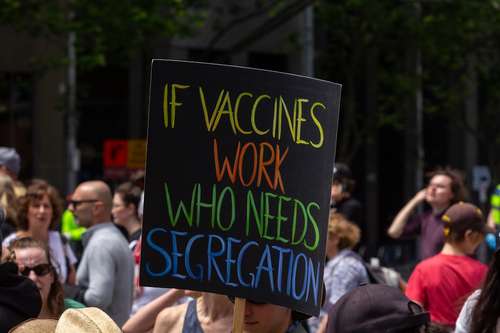Authorities in Shanghai, China's commercial metropolis, reported 58 new Covid-19 cases outside of areas under lockdown on Monday, while Beijing continued to test millions of people on a May Day holiday few were celebrating.
Shanghai's tough coronavirus measures have sparked unusual public outrage, with millions of the city's 25 million residents trapped indoors for more than a month, some confined to fenced-in residential areas, and many unable to obtain basic supplies.
Residents of Shanghai heaved a sigh of relief over the weekend when it was announced that no cases had been confirmed outside of the two-day lockdown zones, but sadness arrived on Monday with the news of the 58 new infections.
At a press conference, authorities did not comment on the new cases, but members of the public expressed their opinions online.
One commenter on the Weibo social media platform said, "They stated that they stamped out incidents at the community level too early."
Many people were encouraged by data that showed good trends, such as 32 new deaths on Sunday, down from 38 the day before, and 6,804 new local cases, down from 7,189 the day before.
Another Weibo user expressed optimism for May.
Despite the decrease in instances, new barriers were constructed at some Shanghai residential blocks on Monday, however police said employees of enterprises on the government's production priority list may ask for a pass if their building had no complaints for seven days.
Beijing tourist venues empty
[caption id="attachment_9583" align="aligncenter" width="734"]

Women dressed in traditional Hanfu clothing prepare proof of their negative tests before entering the Forbidden City[/caption]
On Sunday, major Beijing tourist attractions were nearly abandoned, and restaurant traffic came to a halt, as a typically busy public holiday was overshadowed by a COVID pandemic that has put millions of people on lockdown across the country.
China's strict zero-COVID policy has kept the virus at away for more than two years, but thanks to an Omicron-fueled wave, it is now facing its biggest breakout since the pandemic began.
As she scanned for clients throughout Beijing's Dongcheng area - home to ancient landmarks such as the Forbidden City – a restaurant staff surnamed An observed, "It will have a definite impact on sales."
Nearby restaurants were closed, with some allowing customers to purchase takeout only if they passed a COVID test. This is the most recent restriction imposed by Beijing officials, who stipulate that all visitors in public locations must have received a negative test result within the previous 48 hours.
"Of course, we will follow the rules of the country," An stated. "However, we make less money from delivery, and our sales volume is lower."
The Temple of Heaven, one of China's most popular tourist destinations, is routinely packed with tens of thousands of people each day. On Sunday, though, disguised families were able to take selfies along the imperial complex without being interrupted.
Even Wangfujing, the city's main shopping district, which is known for its food vendors and fashionable boutiques, was barren.
Stacks of marinated chicken feet, flatbreads, and cold cuts in takeaway containers sat on an outdoor table at a restaurant not far from the unusually quiet Forbidden City palace complex.
Millions physically barricaded into their homes
[caption id="attachment_9584" align="aligncenter" width="702"]

Workers are seen at the entrance of a neigborhood during a Covid-19 coronavirus lockdown in the Jing'an district in Shanghai.[/caption]
Millions of people have been physically walled into their homes in Shanghai, the world's largest city, with some claiming to be starving. Those who report diseases are incarcerated in massive quarantine facilities. For nearly a month, vital office workers have been locked to their buildings, sleeping at their workstations.
It stands in stark contrast to the rest of the world, which has adopted a policy of "living with COVID" owing to the exceptional success of vaccinations developed in the United States and the United Kingdom. But it isn't only the Chinese Communist Party's natural need for ruthless social control that has kept it committed to its "zero-COVID" policy.
Its own vaccinations, such as Sinovac, are ineffective, particularly against emerging COVID strains. They are better than no vaccine, but another issue is that the elderly, who are the most vulnerable to the disease, have had the lowest uptake. Around 40% of Chinese people over the age of 80 are unvaccinated.
 Women dressed in traditional Hanfu clothing prepare proof of their negative tests before entering the Forbidden City[/caption]
On Sunday, major Beijing tourist attractions were nearly abandoned, and restaurant traffic came to a halt, as a typically busy public holiday was overshadowed by a COVID pandemic that has put millions of people on lockdown across the country.
China's strict zero-COVID policy has kept the virus at away for more than two years, but thanks to an Omicron-fueled wave, it is now facing its biggest breakout since the pandemic began.
As she scanned for clients throughout Beijing's Dongcheng area - home to ancient landmarks such as the Forbidden City – a restaurant staff surnamed An observed, "It will have a definite impact on sales."
Nearby restaurants were closed, with some allowing customers to purchase takeout only if they passed a COVID test. This is the most recent restriction imposed by Beijing officials, who stipulate that all visitors in public locations must have received a negative test result within the previous 48 hours.
"Of course, we will follow the rules of the country," An stated. "However, we make less money from delivery, and our sales volume is lower."
The Temple of Heaven, one of China's most popular tourist destinations, is routinely packed with tens of thousands of people each day. On Sunday, though, disguised families were able to take selfies along the imperial complex without being interrupted.
Even Wangfujing, the city's main shopping district, which is known for its food vendors and fashionable boutiques, was barren.
Stacks of marinated chicken feet, flatbreads, and cold cuts in takeaway containers sat on an outdoor table at a restaurant not far from the unusually quiet Forbidden City palace complex.
Women dressed in traditional Hanfu clothing prepare proof of their negative tests before entering the Forbidden City[/caption]
On Sunday, major Beijing tourist attractions were nearly abandoned, and restaurant traffic came to a halt, as a typically busy public holiday was overshadowed by a COVID pandemic that has put millions of people on lockdown across the country.
China's strict zero-COVID policy has kept the virus at away for more than two years, but thanks to an Omicron-fueled wave, it is now facing its biggest breakout since the pandemic began.
As she scanned for clients throughout Beijing's Dongcheng area - home to ancient landmarks such as the Forbidden City – a restaurant staff surnamed An observed, "It will have a definite impact on sales."
Nearby restaurants were closed, with some allowing customers to purchase takeout only if they passed a COVID test. This is the most recent restriction imposed by Beijing officials, who stipulate that all visitors in public locations must have received a negative test result within the previous 48 hours.
"Of course, we will follow the rules of the country," An stated. "However, we make less money from delivery, and our sales volume is lower."
The Temple of Heaven, one of China's most popular tourist destinations, is routinely packed with tens of thousands of people each day. On Sunday, though, disguised families were able to take selfies along the imperial complex without being interrupted.
Even Wangfujing, the city's main shopping district, which is known for its food vendors and fashionable boutiques, was barren.
Stacks of marinated chicken feet, flatbreads, and cold cuts in takeaway containers sat on an outdoor table at a restaurant not far from the unusually quiet Forbidden City palace complex.
 Workers are seen at the entrance of a neigborhood during a Covid-19 coronavirus lockdown in the Jing'an district in Shanghai.[/caption]
Millions of people have been physically walled into their homes in Shanghai, the world's largest city, with some claiming to be starving. Those who report diseases are incarcerated in massive quarantine facilities. For nearly a month, vital office workers have been locked to their buildings, sleeping at their workstations.
It stands in stark contrast to the rest of the world, which has adopted a policy of "living with COVID" owing to the exceptional success of vaccinations developed in the United States and the United Kingdom. But it isn't only the Chinese Communist Party's natural need for ruthless social control that has kept it committed to its "zero-COVID" policy.
Its own vaccinations, such as Sinovac, are ineffective, particularly against emerging COVID strains. They are better than no vaccine, but another issue is that the elderly, who are the most vulnerable to the disease, have had the lowest uptake. Around 40% of Chinese people over the age of 80 are unvaccinated.
Workers are seen at the entrance of a neigborhood during a Covid-19 coronavirus lockdown in the Jing'an district in Shanghai.[/caption]
Millions of people have been physically walled into their homes in Shanghai, the world's largest city, with some claiming to be starving. Those who report diseases are incarcerated in massive quarantine facilities. For nearly a month, vital office workers have been locked to their buildings, sleeping at their workstations.
It stands in stark contrast to the rest of the world, which has adopted a policy of "living with COVID" owing to the exceptional success of vaccinations developed in the United States and the United Kingdom. But it isn't only the Chinese Communist Party's natural need for ruthless social control that has kept it committed to its "zero-COVID" policy.
Its own vaccinations, such as Sinovac, are ineffective, particularly against emerging COVID strains. They are better than no vaccine, but another issue is that the elderly, who are the most vulnerable to the disease, have had the lowest uptake. Around 40% of Chinese people over the age of 80 are unvaccinated.




